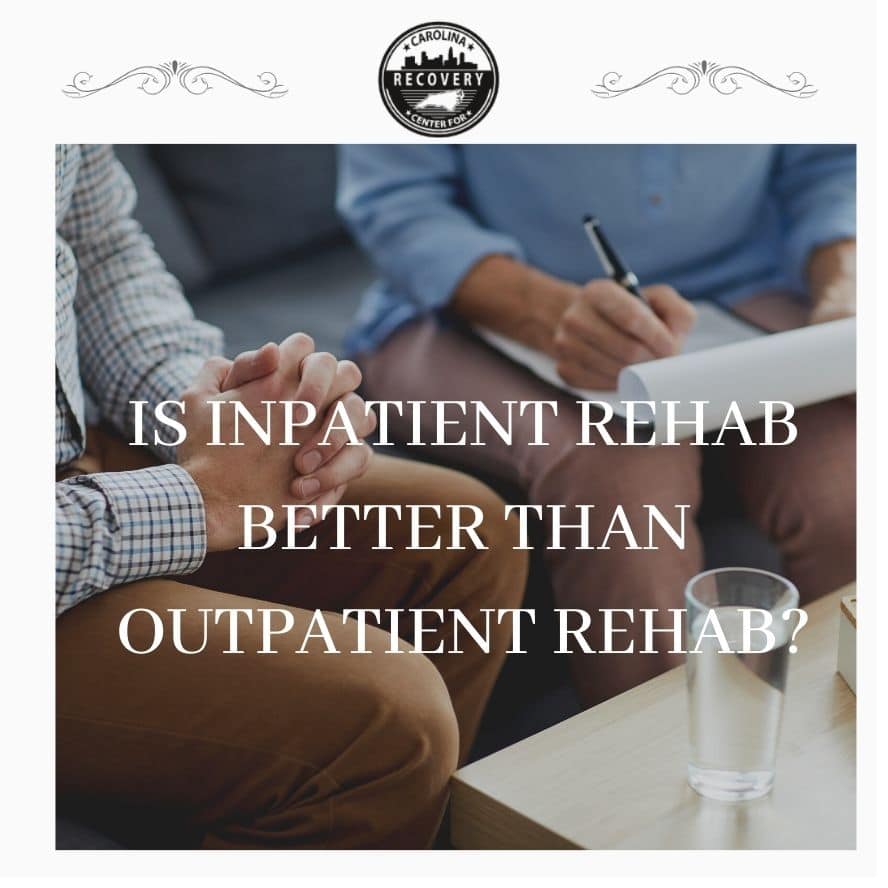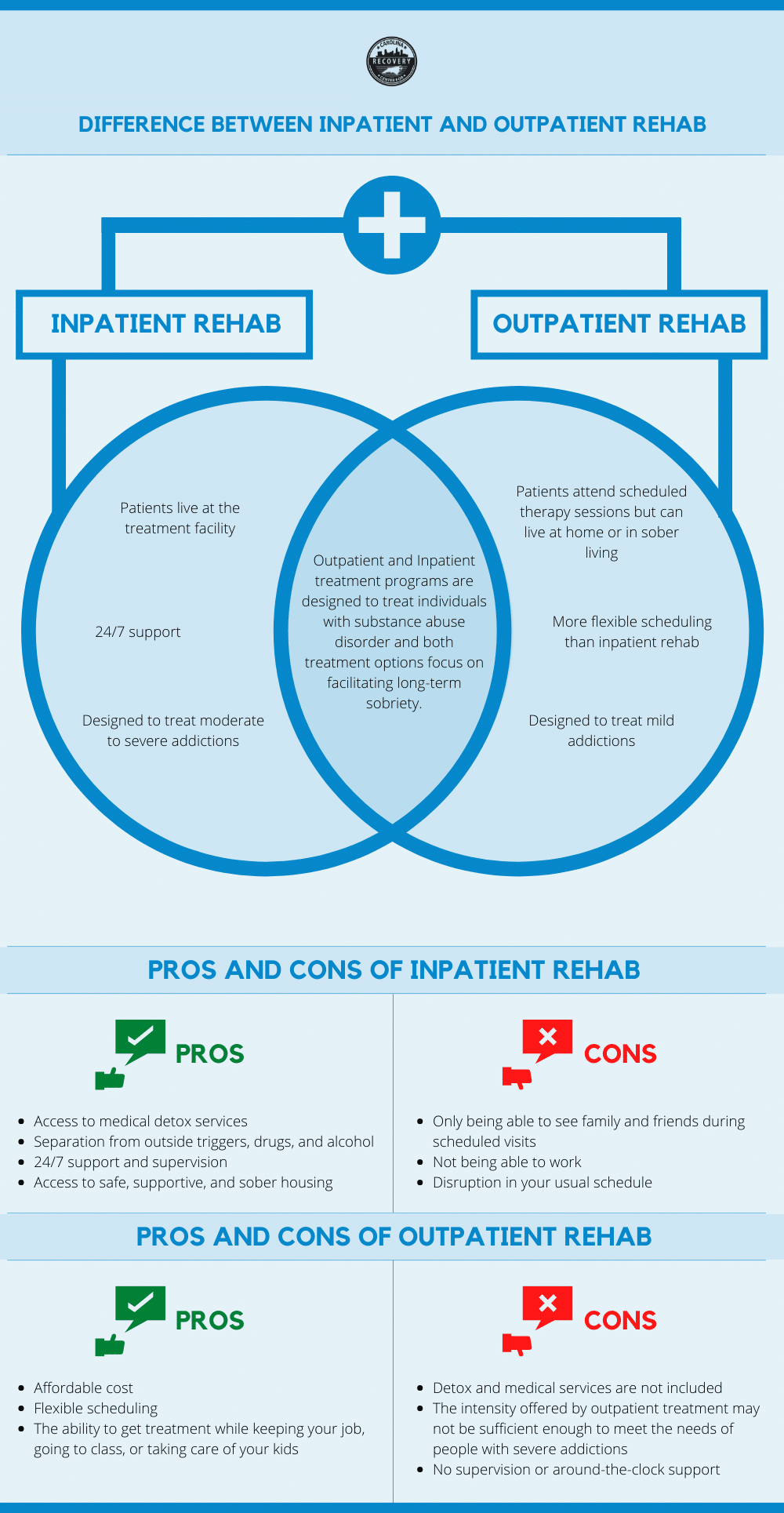Is Inpatient Rehab Better than Outpatient Rehab?

Medically Verified: 2/1/24
Medical Reviewer
Chief Editor

All of the information on this page has been reviewed and verified by a certified addiction professional.
Making the decision to seek treatment for your addiction is a huge accomplishment. Now, you have to make decisions regarding your care. If you’ve never been to rehab before, you may be unfamiliar with your different treatment options. One of the first questions people ask themselves when choosing an addiction treatment program is whether they need inpatient or outpatient rehab. Although one is not necessarily better than the other, it’s important to figure out which one is more likely to place you on the road to success.
The Difference Between Inpatient and Outpatient Rehab

Inpatient drug and alcohol rehab programs provide residential treatment services and around-the-clock care for people struggling with addiction. If you go to inpatient rehab, you won’t be allowed to leave the rehab facility for the duration of your stay. You live in the rehab center’s housing and remain under their care and supervision 24/7. Inpatient programs usually include medical detox and on-site medical services.
Outpatient rehab, on the other hand, provides scheduled therapy sessions on an ambulatory basis. If you go to outpatient rehab, you are able to live at home, dictate your daily choices, and even continue working while you attend your therapy sessions. Outpatient programs vary in intensity with some requiring up to 20 hours a week of counseling and others only holding 1-2 short therapy sessions per week. Detox and medical services are usually not included with an outpatient program.
While both treatment options have their pros and cons, inpatient rehab is generally preferred for people with severe addictions and those with co-occurring health conditions. Many patients choose to attend inpatient rehab for several weeks before transitioning to a lower level of care like outpatient.
Pros and Cons of Inpatient Rehab
One way to help you decide whether inpatient or outpatient rehab will be more effective for you is to weigh the pros and cons while considering your individual needs.
Benefits of inpatient treatment include:
- Access to medical detox services
- Separation from outside triggers, drugs, and alcohol
- 24/7 support and supervision
- Access to safe, supportive, and sober housing
The primary disadvantage of inpatient rehab is the cost. Inpatient programs offer far more services and housing, so they are more expensive. Fortunately, health insurance will provide coverage for inpatient care.
Other disadvantages of inpatient rehab are:
- Only being able to see family and friends during scheduled visits
- Not being able to work
- Disruption in your usual schedule
Pros and Cons of Outpatient Rehab
Like inpatient, there are also pros and cons of outpatient rehab.
Pros:
- Affordable cost
- Flexible scheduling
- The ability to get treatment while keeping your job, going to class, or taking care of your kids
Cons:
- Detox and medical services are not included
- The intensity offered by outpatient treatment may not be sufficient enough to meet the needs of people with severe addictions
- No supervision or around-the-clock support
Is Inpatient or Outpatient Rehab More Effective?
Both inpatient and outpatient substance abuse treatment programs can be effective if they provide you with individualized care. However, there are additional aspects that make treatment “effective.” For instance, no rehab program will be effective if you don’t participate in therapy, take the suggestions that are given to you, and follow the aftercare plan you are provided with. Rehab is what you make it, and the more energy you put into treatment, the better results you will see.
With that said, residential treatment programs do have better success rates than outpatient ones in patients who have severe addictions or co-occurring health conditions that require more intensive care.
So, how do you know which level of care you should participate in? Here are the signs you are a good fit for an inpatient program:
- You have a severe substance use disorder
- You need medical detox services
- You have a co-occurring health condition like depression, anxiety, or bipolar disorder
- You have a history of relapsing during outpatient programs
- You were referred to a residential program by a healthcare provider
Signs you may be successful in an outpatient program include:
- You have a mild substance use disorder
- You do not require medical detox services
- You’ve already completed an inpatient program but are looking for continuing care
- You are highly motivated in your recovery and have a strong support system at home
If you’re unsure of whether inpatient or outpatient rehab is right for you, reach out to one of our dedicated addiction specialists today.
Find The Right Addiction Treatment Program for You
Here at Carolina Center for Recovery, We take a holistic approach to treating addiction, offering a variety of treatment modalities centered around identifying and resolving the underlying issues associated with the addiction. Each client enrolled in our program will receive individual attention from a therapist and psychiatrist as well as gaining exposure to a multitude of traditional and alternative therapies.
If you or a loved one are ready to begin a new way of life, give us a call today.

